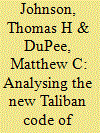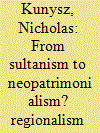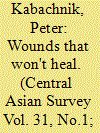|
|
|
Sort Order |
|
|
|
Items / Page
|
|
|
|
|
|
|
| Srl | Item |
| 1 |
ID:
110792


|
|
|
|
|
| Publication |
2012.
|
| Summary/Abstract |
Periodically, Afghanistan's Taliban leadership formally issues Layeha or 'codes of conduct' for their fighters and supporters. Layeha offer important insights into the Afghan Taliban's objectives, strategies and the psyche/perspective of Taliban leadership. This article presents an analysis of the Taliban's code of conduct and examines what Layeha tell us about Taliban objectives, strategy and organization. Such information would seem particularly important as the United States as well as its coalition allies assess their Afghan operational strategy as well as exit strategy from Afghanistan. This analysis of the Layeha suggests that the Taliban remain most concerned with: chain of command principles preventing the fragmentation of the various Taliban networks; obtaining and maintaining public support by winning 'hearts and minds' of local residents; ensuring enough fighters remain engaged in combat; and galvanizing the perception that the Taliban represent a capable, desirable and fair alternative to the current Afghan political establishment.
|
|
|
|
|
|
|
|
|
|
|
|
|
|
|
|
| 2 |
ID:
110789


|
|
|
|
|
| Publication |
2012.
|
| Summary/Abstract |
A new political development that emerged after the disintegration of the Soviet Union was the adoption of 'homeland stances' by the newly independent states. Through the construction of the homeland image, the states of the region claimed responsibility not only for their own citizens, but also for a diaspora community of co-ethnics. Kazakhstan became one of these states and its leadership portrayed Kazakhstan as the homeland of the Kazakh diaspora. Furthermore, Kazakhstan's leadership developed far more active homeland rhetoric and initiated an ethnic return-migration policy as early as 1992. This paper will explore the discourse of Kazakhstan's leadership on the repatriation of its co-ethnics as well as the legal and political context that it created to achieve their smooth absorption into domestic society.
|
|
|
|
|
|
|
|
|
|
|
|
|
|
|
|
| 3 |
ID:
110788


|
|
|
|
|
| Publication |
2012.
|
| Summary/Abstract |
This article examines the way the cultural revival in post-Soviet Kazakhstan is perceived by both the state and militants from non-titular nationalities. Based on ethnographic material, the author analyses state engineering of cultural diversity and the strategies elaborated by militants of Tatar cultural associations to manage the status quo, as well as the preservation of 'cultural intimacy'. The study points to convergences between the state discourse about inter-ethnic concord and the practices of cultural national militants. It also shows that behind this apparent status quo, the cultural sphere has become the arena where the issue of the recognition of full-fledged citizenship and the legitimacy to reside in Kazakhstan is raised and disputed by non-Kazakh groups, albeit implicitly.
|
|
|
|
|
|
|
|
|
|
|
|
|
|
|
|
| 4 |
ID:
110787


|
|
|
|
|
| Publication |
2012.
|
| Summary/Abstract |
This paper proposes that under President Berdimuhamedov, the government of Turkmenistan has begun to move away from the 'sultanism' of the Niyazov era. Instead, the new government exhibits characteristics and has pursued policy changes that prepare conditions for the further development and entrenchment of localized networks of elites based on kinship. Such changes suggest that the government of Turkmenistan may develop into a more classic neopatrimonial system of authoritarian governance similar to the other post-Soviet republics in Central Asia. This argument is advanced by examining changes between the governments of former President Niyazov and Berdimuhamedov with regard to three areas of the Turkmen state's relationship with its constituent regions: regional composition of the national cabinet; hakim (governor) policy; and regional development. This examination relies largely on a comprehensive survey of online Turkmen state-media sources, as well as numerous supportive secondary sources.
|
|
|
|
|
|
|
|
|
|
|
|
|
|
|
|
| 5 |
ID:
110791


|
|
|
|
|
| Publication |
2012.
|
| Summary/Abstract |
After two centuries of close relationships, especially under the Mughals, Islamic ties between India and Central Asia have been considerably weakened, first after the Tsarist colonization and then by Soviet religious repression and ideological isolation. However, when Central Asian post-Soviet republics became independent in 1991, they renewed all kinds of links with the Indian subcontinent. Moreover, the revival of Central Asian Islam benefited from inspirational international Islamic sources from Turkey, the Arab countries and India. The latter drew less attention from analysts than other sources of influence, although it has gained ground all over the region in past years, particularly in Kazakhstan and Kyrgyzstan, where the India-based Jama'at al Tabligh has achieved significant success. This Islamic organization, established in British India in the 1920s, defines itself as a non-radical and non-political movement, promoting 'basic' Islamic faith and practice. So far, the Jama'at al Tabligh has been tolerated by local authorities who would rather use them as a shield against the more radical Islamic groups that are openly opposing the regime.
|
|
|
|
|
|
|
|
|
|
|
|
|
|
|
|
| 6 |
ID:
110790


|
|
|
|
|
| Publication |
2012.
|
| Summary/Abstract |
This paper examines the role of territorial integrity narratives in the Republic of Georgia, which currently features two separatist territories - Abkhazia and South Ossetia - which are de facto independent and have begun to receive limited international recognition. Political rhetoric is further buttressed by various government policies and practices that help transmit the message of territorial integrity to the Georgian public. Cartographic anxieties, or the preoccupation and fear of a country's loss of territory, is a central feature of Georgian nationalist discourse. Referring to the loss of territory as amputation exemplifies the cartographic anxieties displayed in Georgia. Specifically, I will focus on the role of political discourse, maps, patriotic youth camps and billboards and other elements of the landscape, documenting how they help to reproduce the discourse of territorial integrity. It is precisely these discourses and practices that reproduce territorial integrity narratives and construct the entire Georgian territory (including Abkhazia and South Ossetia) as integral to Georgian national identity, enabling the separatist regions to be understood as wounds that won't heal.
|
|
|
|
|
|
|
|
|
|
|
|
|
|
|
|
|
|
|
|
|